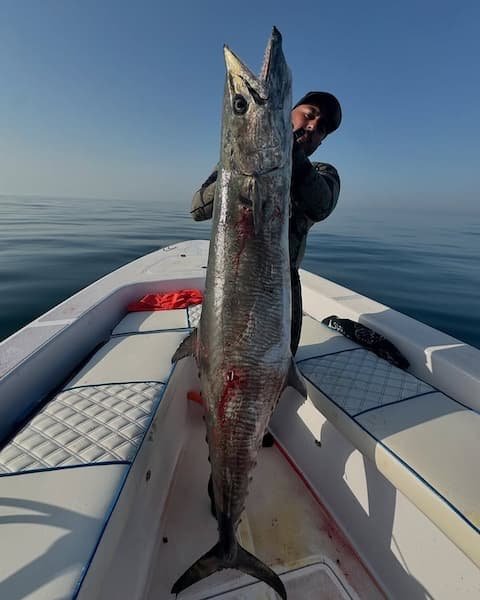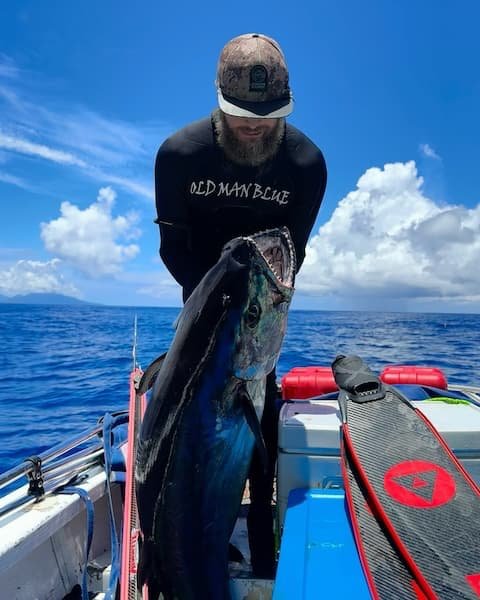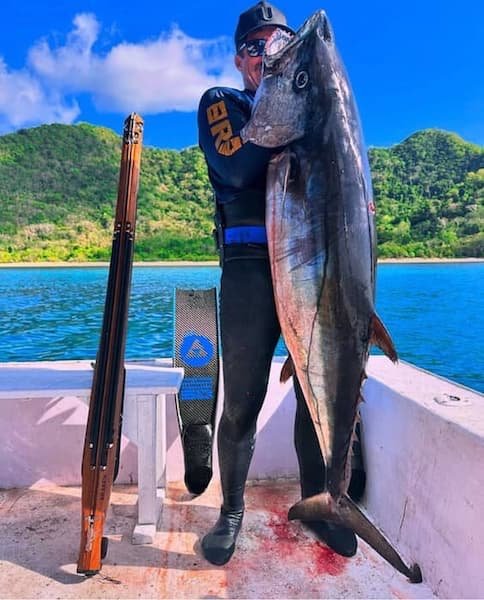
 Roni Essex
Freediver, Spearo, Creator
Roni Essex
Freediver, Spearo, Creator

 Roni Essex
Freediver, Spearo, Creator
Roni Essex
Freediver, Spearo, Creator
I used to think the biggest fish meant the best dive. Like most beginners, I bought into the story — that spearfishing was about proving something. About outsmarting the sea. About coming back with something so big it bent the cooler lid or snapped the stringer. And sure, I’ve had those moments. Grinning at a kilo count, taking the hero shot with a tuna whose eyes were still glassy and wide.
But it didn’t take long for that feeling to rot.
No one tells you how heavy the ocean can feel when you realize you just killed something older than you. Or that you may have shot the last breeding male in a cove where the next generation hasn’t even hatched yet. No one tells you, because most people don’t know. And the ones who do, often don’t care. Or worse — they’re still posting trophy shots like it's 2007 and the internet hasn’t caught up with ethics.
This is about why that needs to change.
Somewhere along the way, spearfishing picked up a God complex. Maybe it was the old spearo legends — the ones who could free dive to 50 meters on a single breath, come up with a grouper the size of a German shepherd, and smoke it for the whole village. Or maybe it was Instagram. Either way, we were told that size equals skill. That bigger meant better. That “sustainability” was for scuba divers and salad bars.
But here’s the truth: a lot of big fish are exactly the ones we shouldn’t be taking.
Many large reef fish — groupers, parrotfish, wrasses — are protogynous hermaphrodites. That means they start life as females and become males later on. The big guys? They're often the only males around, and when you shoot them, you don’t just remove one fish. You break the breeding cycle. You collapse a hierarchy. You leave a void that may take years to fill, if ever.
It’s not a theory. It’s biology.
Let’s talk numbers, because emotion only gets you so far.
- A 30kg dusky grouper might be over 40 years old.
- A coral trout (a favorite among spearos) takes about 7 years to reach 45cm — a size often still under legal limits.
- Napoleon wrasse? They’re endangered, grow slowly, and can live for 30+ years. Shoot one, and you may as well be taking down a small, scaly grandfather.
Fish aren’t fast-food items. You don’t “reorder” next season. They exist on cycles — some of them ancient, fragile, and completely invisible to the untrained eye.
And that’s the problem. The ocean doesn’t scream when it’s bleeding.

Sure you did. So did the last guy. So will the next.
This is the lie we tell ourselves — that our impact is individual, contained, excusable. But when 500 people take “just one” over a season, that’s an entire population. Gone. And unlike line fishing, spearfishing has precision. It’s supposed to be selective. Ethical. Clean. That’s the whole pitch. So why are so many spearos still hunting like it’s a free-for-all?
Part of it’s ego. Part of it’s ignorance. The rest is just inertia. Because we don’t get taught what not to shoot. There’s no universal freediving course module called Don’t Be an Idiot with a Speargun. There should be.
Let’s name names. These species are commonly targeted — and commonly misunderstood:
Dusky Grouper (Epinephelus marginatus) - They’re slow-growing, long-lived, and reproduce late in life. The ones you want to brag about — the 25kg+ beasts — are almost always the key males in their populations. You remove them, you kill the gene pool. Simple as that.
Parrotfish - Besides being gorgeous, they’re reef custodians. Literally. They chew coral, poop sand, and prevent algal overgrowth. Also hermaphroditic, also misfired by careless divers.
Unicornfish - Shot often because of their size and slow reactions. But most people don’t know their numbers are dwindling in certain regions. Plus — pro tip — they taste like disappointment unless you cook them right.
Humphead Wrasse - If you shoot one of these and post it online, you're outing yourself as either clueless or callous. There’s no in-between. They're listed as endangered. That should be enough.

Here’s a dirty little secret about spearfishing photos: most of them are taken after the best part of the story is over.
You don’t see the stalk, the hold, the twitch of the trigger. You see the blood, the grin, and a caption like "Good day at sea.”
But when every image is a kill shot, what are we actually celebrating?
There’s a particular brand of masculinity wrapped up in spearfishing — especially online. It’s not about being in tune with the ocean. It’s about dominance. Which is ironic, considering that the best spearos I know don’t dominate anything. They adapt. They observe. They pass up shots more often than they take them. Because they’re playing the long game.
There’s no leaderboard underwater. Just your conscience.
Want to impress me? Don’t show me a cooler full of overgrown reef fish.
Tell me about the 4-minute dive where you stalked a giant grouper, lined up the shot, felt your finger tighten — and then let it swim away because it didn’t feel right.
Tell me how your heart was pounding. How it vanished into the blue. How you came up shaking, alive, part of the food chain but not its end.
That’s spearfishing too.

Every country has regulations. Size minimums, seasonal bans, protected areas. But if you’re only hunting by the rulebook, you’re missing the point. Laws are the floor. Your ethics should be the ceiling.
Some divers I know have personal limits. They won’t shoot anything over a certain size. Or they skip species entirely. One friend won’t touch any grouper. Another only hunts pelagics. Another carries a camera half the time instead of a gun. That’s the beauty of spearfishing — it can evolve with you.
Start by asking yourself: Would I still take this shot if no one ever saw it?
This isn’t about shaming. I’ve made mistakes. Hell, I’ve made most of them.
But I’ve also learned. And what I’ve learned is that spearfishing gives you access — to ecosystems most people will never witness, to relationships with food that most people have forgotten. And that access comes with responsibility.
So maybe you don’t post that photo of the reef giant this time. Maybe you research fish lifespans. Maybe you teach a younger diver that “letting it grow” isn’t weakness — it’s wisdom.
Maybe size matters less than we think.